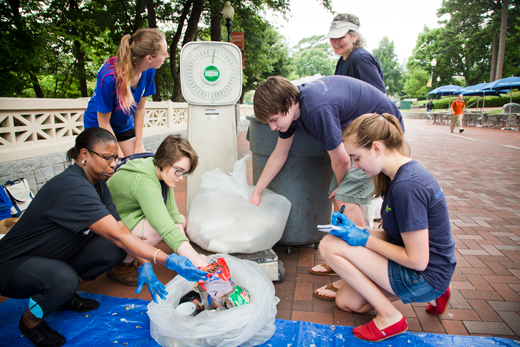Blue-gloved volunteers garnered strange looks from passers-by and tolerated a high-level of "ick" factor last week to determine how well visitors to the Cox Hall Market understand the new recycling and composting bin system put in place earlier this year.
In January, all of the trash bins were removed from immediately outside Cox Hall as part of a pilot program to reduce landfill trash at Emory. Composting and recycling bins were simplified with updated signage featuring photos and explanations of what to put where.
"We wanted to take a look at what was being put in the compost bins versus what is being put into the recycling bins to see if contamination is occurring. This will help us with our education and outreach efforts to determine if we need to change our signage to make things clearer for users," said Emily Cumbie-Drake, sustainability program coordinator for the Office of Sustainability Initiatives (OSI) and Emory Dining.
Compost bins are set up to accept all compostable materials — all uneaten food and drinks plus compostable and paper service products.
Recycling bins were streamlined to accept all recycling materials in one bin rather than requiring users to sort their recycling into several different bins. Recyclable materials include white and mixed paper; aluminum cans; cardboard; glass; and plastics including snack wrappers like granola or candy bar wrappers, zip-top bags, plastic wrap and chip bags.
Students, staff and interns from OSI performed the waste audit June 12 on a sampling of the bins outside Cox Hall’s main doors to see how well the new system is working.
Volunteers picked through several bags of composting and recycling, opening used food containers to pick out recyclable materials and sorting through the soggy mess at the bottom of the bags to separate items into the correct categories.
Of 30 pounds of material that ended up in compost bins, the audit found only about two pounds of material that should have been deposited in recycling bins including chip bags, ketchup packets, soup trays, cracker wrappers, sauce cups and the tops of sushi containers. No landfill waste was found in the composting bins.
"I really expected the results to be worse," said Max Burch 15C, an environmental sciences major and sustainability minor who is a summer intern with OSI. "It seems the students really have the idea of what we’re trying to do."
Recommended changes
The exercise revealed several opportunities for modifying materials coming from Cox Hall in order to make sorting waste easier for customers: sushi containers and pho soup bowls used at Cox Hall are compostable, but sushi grass and the lids for the containers are not. Similarly, users often composted biodegradable meal containers with recyclable sauce cups or sachet waste, such as ketchup packets, inside them.
Based on the audit, Emory Dining will work to transition sachet waste, including condiment packets, and plastic sauce cups to be replaced with paper containers at Cox. They will also recommend that recyclable lids be replaced with compostable lids for sushi and pho soup bowls. However, Emory Dining has had difficulty finding a supplier of compostable lids.
A reliable audit of recyclable materials was not possible because full bags of recyclables were not available, but an audit of recycled materials from the morning of the audit found that some food contamination was present in the recycling bins.
Emory Dining also will review and revise education efforts to encourage users to remove any recyclable waste from compostable containers before composting and they will explore placing two compost bins for every one recycling bin and adding "No Food" signs to recycling bins.
"If the pilot program goes well, we will possibly expand this program to other campus dining locations, so we needed to see if we need more education and outreach before we expand," Cumbie-Drake said.
Commitment to sustainability
The Cox Hall pilot project is part of the university’s goal to divert Emory's total waste stream by 65 percent from the landfill by 2015, including composting, recycling or reusing at least 95 percent of food waste, animal bedding and building construction materials. In fiscal year 2012, Emory composted 487 tons of food waste and animal bedding, keeping those materials out of landfills.
Emory partners with Southern Green Industries to haul the compostable material collected on campus to a permitted composting facility near Toccoa, Georgia. This industrial-scale composting facility uses very high temperatures to destroy pathogens and decompose materials, which enables Emory to compost meat bones, paper products and other items that are not usually compostable in residential composting systems.
After a 90-day process, some of the compost is returned to campus for use in semi-annual planting beds.
Waste-audit volunteer and staff member Dawn Francis-Chewning has been a Sustainability Building Representative at Emory since the program was formed in 2007.
"Emory has really made a difference in the way we handle what we call trash. I don’t know anywhere else that composts the way Emory does," she said. "This way it can go back to the Earth, so the Earth feeds us and we feed the Earth."

